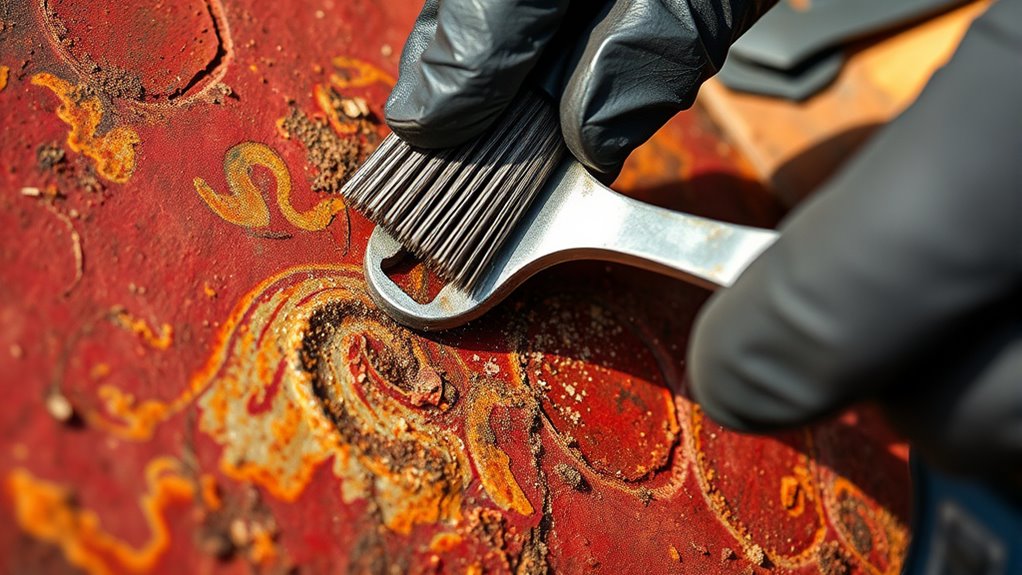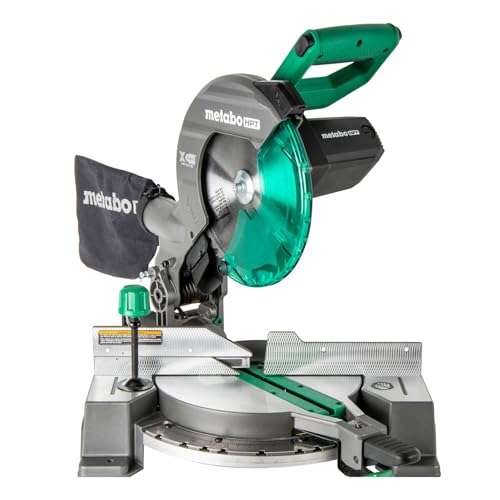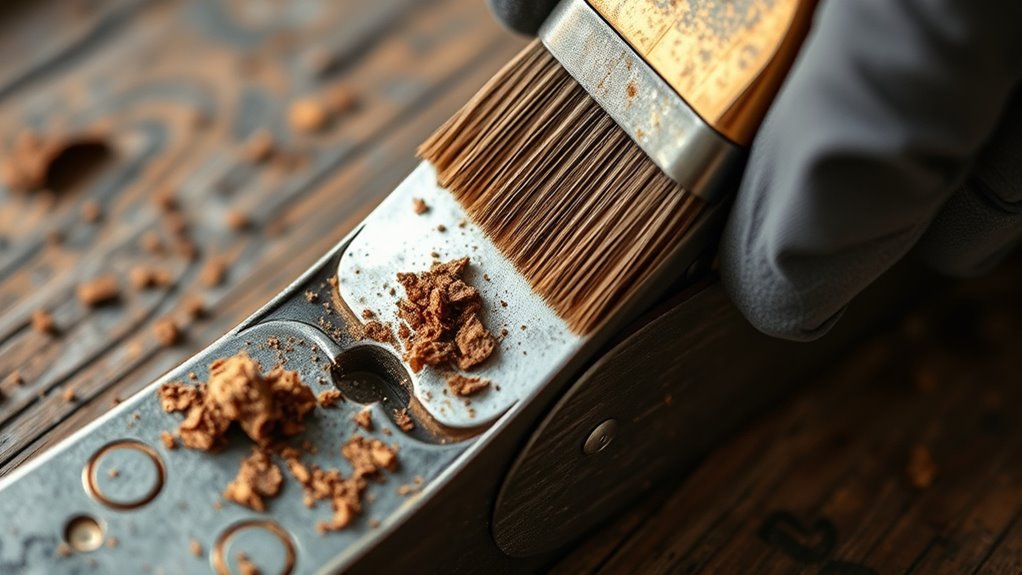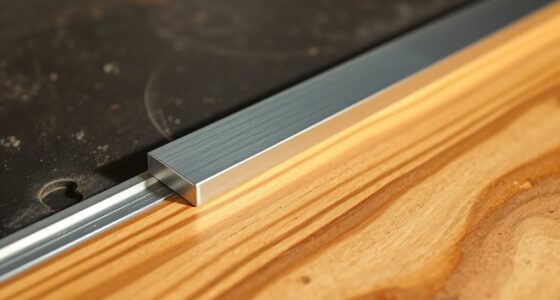To clean your hand tools and remove rust and resin build-up, start by wiping tools with a clean cloth to remove dirt and moisture. For rust, use fine steel wool or sandpaper to gently scrub affected areas, then apply a light coat of oil or rust inhibitor for protection. To eliminate resin, soak tools in mineral spirits or use a wire brush to loosen residues. Keep tools in top shape by following these steps—learn more tips if you continue.
Key Takeaways
- Use gentle abrasives like steel wool or fine sandpaper to remove surface rust effectively.
- Soak tools in mineral spirits or specialized solvents to loosen and remove hardened resin build-up.
- Wipe tools with a clean cloth after use to prevent moisture and dirt accumulation.
- Apply a light coat of oil or rust inhibitor post-cleaning to prevent future rust formation.
- Regularly inspect and maintain tools to identify early rust or resin issues and address them promptly.

Have you ever wondered why your hand tools seem to wear out or perform poorly over time? The answer often comes down to proper tool maintenance and the effects of rust and resin build-up. When you neglect these aspects, your tools can become less effective, more difficult to use, and prone to damage. Fortunately, regular cleaning and rust prevention are simple steps that can extend the lifespan of your hand tools and keep them in top shape.
Rust is one of the biggest enemies of hand tools. It forms when moisture comes into contact with metal surfaces, creating corrosion that weakens the tool’s structure. To prevent rust, it’s essential to keep your tools dry and store them properly. After each use, wipe them down with a clean cloth to remove any moisture or dirt. Applying a light coat of oil or a rust inhibitor can provide an extra layer of protection, especially for tools stored in humid environments. This proactive approach to tool maintenance helps prevent rust from forming in the first place, saving you time and money on repairs or replacements.
Keep your tools dry and coated with oil to prevent rust and prolong their lifespan.
Resin build-up is another common issue, especially with tools used for cutting, drilling, or working with adhesives and lubricants. Resin can harden and stick to your tools, hampering their performance and making cleaning more difficult over time. To combat this, you should clean your tools thoroughly after each use, particularly if you work with sticky substances. Soaking tools in a solvent like mineral spirits or using a wire brush can effectively remove resin residues. Be sure to wear gloves and work in a well-ventilated area when handling solvents. Regular cleaning not only keeps your tools functioning smoothly but also reduces the risk of resin hardening and causing long-term damage.
In addition to cleaning, inspecting your tools regularly is essential. Look for signs of rust, resin build-up, or wear, and address problems immediately. For rust, gentle abrasive methods like steel wool or fine sandpaper can remove surface corrosion, but always follow up with oil for rust prevention. For resin, proper cleaning techniques will keep your tools in prime condition and prevent buildup from impairing their precision. Incorporating glycolic acid into your cleaning routine, where appropriate, can help in breaking down stubborn residues and revealing a clean surface. Remember, consistent tool maintenance is key to ensuring your hand tools remain durable and reliable. With just a little effort, you can keep rust at bay, remove stubborn resin, and enjoy the full lifespan of your tools. Proper cleaning and rust prevention are simple but effective ways to optimize your work and protect your investment.

Indexable Carbide Insert Knife 14.3x14.3x2.0mm-50° 2-Edge Replacement Cutter for Cutech Tool Rikon Carbatec and Most Planer Jointer Helical Cutterheads, 10 Packs
Standard Cutter Size: 14.3mm square with straight corners 2mm thick,2 indexable cutting edges, 50 degree cutting bevel. Inserts...
As an affiliate, we earn on qualifying purchases.
Frequently Asked Questions
Can I Use Household Vinegar for Rust Removal?
Yes, you can use household vinegar for rust removal because vinegar effectiveness makes it a popular, natural alternative rust remover. Soak your rusty tools in vinegar for a few hours, then scrub off the rust with a brush. While vinegar works well, you might also consider alternative rust removers like baking soda or commercial products if you’re dealing with stubborn rust or resin build-up.
How Often Should I Clean My Hand Tools?
You might think your tools can go forever without cleaning, but regular tool maintenance actually extends their life. Ideally, clean your hand tools after every project or weekly if used frequently. This cleaning frequency prevents rust and resin build-up, keeping your tools sharp and effective. Ignoring proper maintenance may save time initially, but ultimately, neglect leads to costly replacements. So, stay ahead with consistent cleaning to guarantee your tools perform at their best.
Are There Eco-Friendly Cleaning Options?
Yes, there are eco-friendly cleaning options for your hand tools. You can use biodegradable cleaners and natural solvents like vinegar, lemon juice, or baking soda, which effectively remove rust and resin build-up without harming the environment. These options are safe, non-toxic, and sustainable, making your cleaning routine eco-conscious. Just apply the natural solvent, scrub gently, and rinse for clean tools that stay in top shape while protecting the planet.
What Safety Precautions Are Needed During Cleaning?
During cleaning, you should wear protective gear like gloves and goggles to prevent skin and eye irritation from rust remover chemicals. Guarantee good workspace ventilation to avoid inhaling fumes, especially when using stronger or chemical-based cleaners. Keep your work area well-ventilated, and consider using eco-friendly solutions to reduce hazardous fumes. Always follow safety instructions on product labels, and work in a clean, organized space to minimize accidents.
Can Resin Buildup Damage My Tools Permanently?
Resin buildup can cause resin damage if left untreated, potentially leading to corrosion or weakening of your tools. Over time, this buildup can reduce your tools’ effectiveness and shorten their longevity. To prevent this, clean resin regularly using appropriate solvents, and avoid neglecting resin removal. Proper maintenance guarantees your tools stay in good shape longer, preserving their performance and preventing costly replacements down the line.

Findbuytool Carbide Inserts cutters (15x15x2.5mm-30°-R150-4R0.5) Insert for Woodworking Helical Cutter Head Tools, 10 Pcs (10)
{Product Contains}:10pcs Carbide Insert Knife 15x15x2.5mm-30°-R150-4R0.5 for Helical Cutterhead.
As an affiliate, we earn on qualifying purchases.
Conclusion
By regularly cleaning your hand tools, you guarantee they stay in top shape and last longer. Imagine saving money and avoiding frustration when your favorite hammer works perfectly during a vital project. For example, Sarah cleaned her rusted wrench and removed stubborn resin, saving her from buying new tools. With just a little effort, you can keep your tools in prime condition and avoid costly replacements. Start cleaning today and enjoy reliable, lasting tools for all your projects.

POWERTEC 14.3mm Carbide Inserts Cutter Knives for Spiral & Helical Cutterheads - Fits Wen PL1326, JT630H & Rikon 25-130H, Tungsten Carbide Replacement Blades for Planer and Jointer (14301)
INCLUDES: (10) Carbide Insert Blades
As an affiliate, we earn on qualifying purchases.

Metabo HPT 10-Inch Single Bevel Compound Miter Saw, 15-Amp Power Saw with Xact Cut Shadow Line, Precision Miter Angles, Single Bevel 0-45°, 40T TCT Miter Saw Blade, Lightweight Design, C10FCG2
POWERFUL AND PRECISE: This 10-inch single bevel compound miter saw features a 15-Amp motor delivering high power for...
As an affiliate, we earn on qualifying purchases.









